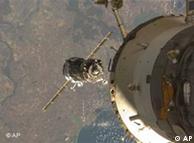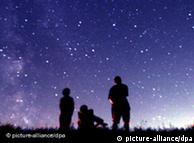International Space Station to crash into Pacific after 2020
A top Russian space official says the ISS will fall to Earth as a way to
avoid leaving space junk. No concrete plans have been made so far to
replace the orbiting scientific laboratory.
In an interview with the television program "Morning of Russia," a
top-level Russian space official has said that that International Space
Station (ISS) will be de-commissioned and fall into the Pacific Ocean
in not long after its end-date of "approximately 2020."
In the Russian-language interview, which was posted Wednesday on
Roscosmos' website, Vitaly Davydov, the space agency's deputy chief,
said that the aim was to avoid leaving more space junk.
"After it completes its existence, we will be forced to sink the
ISS," he said. "It cannot be left in orbit, it's too complex, too heavy
an object, it can leave behind lots of rubbish."
In April 2011, the European Space Agency voted to extend space operations aboard the ISS until at least 2020.
 With the loss of the shuttle program, only the Russian Soyuz can travel to the ISSA possible 'testbed' With the loss of the shuttle program, only the Russian Soyuz can travel to the ISSA possible 'testbed'
The ISS will likely meet the same end as the Russian space station
Mir, which was in operation from 1983 until 1998, before falling to
Earth in 2001. The ISS began construction in orbit in 1998 and was
originally designed to last 15 years, which it has now exceeded.
Also on Wednesday, ESA said in a press release that the ISS, which it
estimates will have a total cost of approximately 100 billion euros
($143 billion) over its lifetime, could take on a "new role," as a
possible "testbed" for future deep space missions.
"Future ventures could include Mars missions, lunar habitats or
travelling to an asteroid – all needing new technologies and techniques
that could be tested on the station," the organization posted on its
website.
One British space science expert said that the ISS isn't really
needed for space science and other astrophysics research, but that it is
need to examine biological effects on human space travel.
"The ISS has always been limited in what science it can do," said
Martin Barstow, a professor of astrophysics and space science at the
University of Leicester in the United Kingdom.
"It can do a lot of good things," he told Deutsche Welle.
"It can do a lot of things that you can’t do in any other way, like
studying the biological effects of space. That’s only worth doing if you
have a long-term goal, like going to Mars, because that’s when it
becomes critical."
 European scientists do not want to lose the opportunity to do more space science researchA new space station? European scientists do not want to lose the opportunity to do more space science researchA new space station?
It remains unclear what future space stations will look like, or even if they will be built.
In the same interview, Davydov said "there are several possibilities."
"I cannot rule out that it will be used to put together, create the complexes that in the future will fly to the Moon and Mars."
Some European space scientists have previously called for a European expansion of ISS missions.
In a March 2010 opinion piece published in the International Herald
Tribune newspaper, Giovanni F. Bignami, the former president of the
Italian Space Agency, and a professor of astronomy at the Instituto
Universitario di Studi Superiori in Pavia, Italy, argued that the
European space community was "brimming with ideas."
"We already have on board, for example, an antimatter search with a
super-cooled magnet: A dream for physicists and engineers," he wrote.
"Then there's the I.S.S. potential for biosciences, from microbe trays
exposed to space to human osteoporosis."
He also cautioned that without astronauts aboard the ISS, "European
public interest in space will wane, as it did in the United States in
the post-Apollo era, when no American flew into space from 1975 to
1981."
Author: Cyrus Farivar (AFP)
Editor: Nathan Witkop
http://www.dw-world.de/dw/article/0,,15274137,00.html
| 








